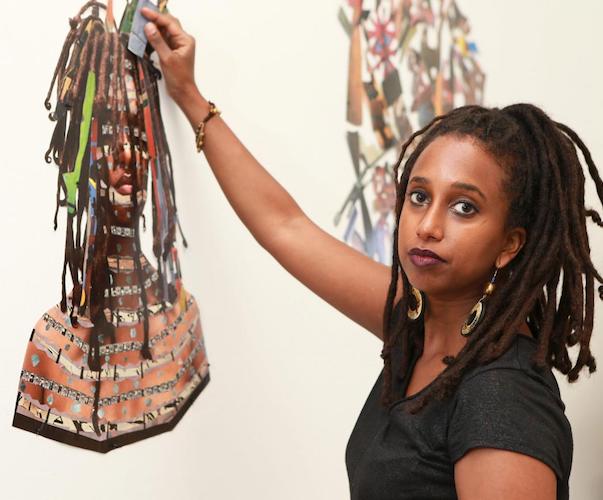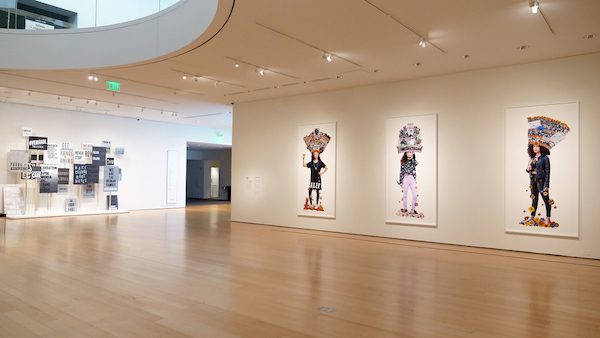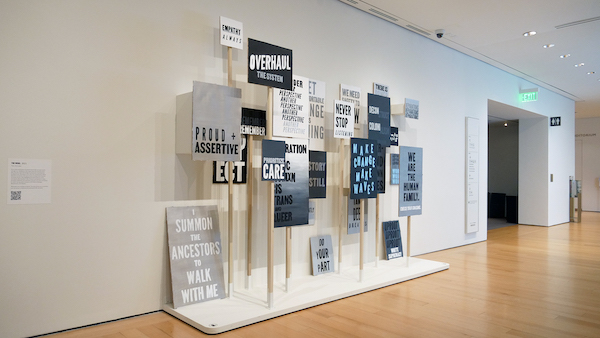Visual Arts Review: Helina Metaferia’s “Generations” — A Story of Heritage and a Call for Change
By Chloe Pingeon
The social message of Generations is powerful and clear: it is time to be AWAKE + OUTRAGED.

A picture of Helina Metaferia in her studio. Photo: MFA.
Glass doors lead into a space of white walls, bright lighting, and black text. To the left of the doors, the show’s title, Helina Metaferia: Generations(through April 3, 2022, at Boston’s Museum of Fine Arts) is emblazoned in bold black letters. To the right, a diminutive label takes up a white wall. It reads ACKNOWLEDGMENTS. Beneath the heading, italicized text explains that every exhibition is a result of collaboration, care, and shared labor. In this way, Metaferia pays homage to those whose work went into every facet of the project. On her Instagram account, Metaferia points out the value of these acts of recognition, suggesting that artists are called on to pay due credit to all the labor and the voices of those who contributed to the making of their creations. In the gallery, the “acknowledgments” wall label is small, to the point that it would perhaps be easy to miss at first glance. And yet it makes an emphatic statement — standing alone, the sole occupant of a large white wall.
Given the themes of this exhibition, Metaferia’s acknowledgments take a visionary significance. Generations is dedicated to celebrating the overlooked impact of women of color, whose accomplishments have been historically minimized or ignored. She is particularly interested in the ways that activists have shaped (and are shaping) the future. Metaferia’s moral/political/aesthetic stance is partly about ensuring that her work does not contribute to the silencing that she critiques in her art. In the show, she credits everyone she can, to the point that she notes the names that are missing, names that MFA would not let her include in the acknowledgments. Obviously, there is still work to be done.

A view of the “Headdress Series” in Generations gallery.
Metaferia is an interdisciplinary artist based in New York City, one of a number who are working across mediums as they explore an interest in interrogating the body’s relationship with place and identity. In the past, she has used live performances to honor the themes of heritage and physicality. Understandably, Metaferia’s work has strong ties to ancestry and lived experience. In her show at the MFA, Metaferia moves with comfortable fluidity among disciplines. Three large rectangular portrait photographs line the first wall in the gallery. They are part of the “Headdress Series” (2021): the models were female students and faculty chosen from Boston area universities. The women wear a blend of streetwear and bold colors and their bodies are outlined on white canvases. Each female stands on a bed of collaged flowers, the first level orange colored, the next pink and white, the third yellow and blue. Each woman wears a headdress, which at first glance pays coordinated homage to the colors of the flowers on which they stand. A closer look, however, reveals that the headdresses are composed of newspaper clippings, of pictures of figures in protest. The raised fist characteristic of the Black Lives Matter movement is prominent on one headdress; another features, in pink bubble letters, the words AWAKE + OUTRAGED. These headdresses are crowns, their imagery collaged from BIPOC liberation archives. Metaferia envisions every woman of color as an activist: the weight of the past and the potential for change sits on their heads.

A view of “THE WOKE” at the Generations installation.
Across the gallery, “THE WOKE” (2021) is assembled. A series of black and gray signs are mounted on wooden sticks that are staggered against a white background. Metaferia has engaged in interactive crowdsourcing her past solo exhibitions and this installation is the result. She posed the question“What is your everyday revolution” for online response. The protest signs on display were inspired by the responses. MAKE CHANGES MAKE WAVES, reads one of the signs in the center of the piece. Behind it, in gray letters on a black background hangs the words HISTORY IS STILL. High up on the wall, to the right — hanging behind vague calls for change that take up the center space — there are more concrete calls to action. ABOLISH CAPITALISM is written in white font on a small black canvas. REPARATIONS REPARATIONS REPARATIONS is inscribed in various shades of gray and black on a light gray background. Almost hidden from sight behind the messages in front: WE NEED SAFETY TO GROW. Resting on the floor in the far left corner, on a large canvas that shimmers in silver, are the words I SUMMON THE ANCESTORS TO WALK WITH ME.
As you view these signs you will hear audio from THE CALL, a film directed by Metaferia. It is an intergenerational story that looks at the lives of four women who were the descendants of powerful civil rights leaders — Dick Gregory, Frederick Douglass, and James Baldwin. The female story is finally being told. George Michael’s song “Star People” can be heard in the background. “It’s time for you to do what you came to do” sings a woman’s voice. We then hear a little girl echo the woman’s words. That combination continues — each lyric of “Star People” is sung, first confidently by the woman and then by a child whose voice is tinctured by wonder, enthusiasm, and hope. “My father always said the most important force is the voice of the black woman/ It’s time for us to be who we were born to be, not taught to be,” asserts the woman. The social message of Generations is powerful and clear: it is time to be AWAKE + OUTRAGED.
Chloe Pingeon is a rising senior at Boston College studying film and journalism. She has written regularly for the features and arts section of Boston College’s Independent Student Newspaper The Heights, and has also written for the culture section of Lithium Magazine. She is currently a creative development intern at Foundation Films.
Tagged: Chloe Pingeon, Helina Metaferia, Helina Metaferia: Generation
